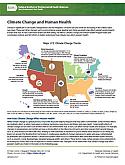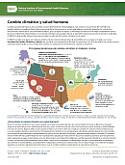Introduction

Climate change is the result of the buildup of greenhouse gases in the atmosphere, primarily from the burning of fossil fuels for energy and other human activities. These gases, such as carbon dioxide and methane, warm and alter the global climate, which causes environmental changes to occur that can harm people's health and well-being.
The NIEHS Climate Change and Human Health Program leads and coordinates the institute's efforts to better understand climate change, in order to protect people's health2 .
How does climate change affect human health?
As the climate continues to change, and weather-related events such as floods, hurricanes, tornados, wildfires, and heat waves become more extreme, the risk to human health grows, exacerbating existing health threats and creating new public health challenges around the world.
Although climate change is a global process, its direct and indirect health effects are local and can profoundly affect communities. It can affect people's health and well-being in many ways, some of which are already occurring3 , by:
- Increasing the frequency and severity of heat waves, leading to more heat-related illnesses and deaths.
- Changing the range of disease-carrying insects, such as mosquitoes, ticks, and fleas that transmit West Nile Virus, dengue fever, Lyme disease, and malaria to humans.
- Increasing exposure to pollen, due to increased plant growing seasons; molds, due to severe storms; and air pollution, due to increased temperature and humidity, all of which can worsen allergies and other lung diseases, such as asthma.
- Increasing temperatures and causing poor air quality that can affect the heart and worsen cardiovascular disease.
- Increasing flooding events and sea level rise that can contaminate water with harmful bacteria, viruses, and chemicals, causing foodborne and waterborne illnesses.
- Increasing the frequency and severity of extreme weather events, in addition to causing injuries, deaths, illnesses, and effects on mental health from damage to property, loss of loved ones, displacement, and chronic stress.
- Placing added stress on hospital and public health systems, and limiting people's ability to obtain adequate health care during extreme climate events.
NIH Climate Change and Health Initiative
The NIH Climate Change and Health Initiative is an urgent effort to reduce health threats from climate change across the lifespan and build health resilience in individuals, communities, and nations around the world, especially among those at highest risk.
Seven NIH Institutes and Centers are involved. The initiative is led by an executive committee, chaired by the NIEHS director. NIEHS provides the initiative's administrative home.
NIH is uniquely positioned to lead a solutions-focused health research initiative to reduce the health consequences associated with extreme weather events and evolving climate conditions. NIH has a strong history of creating innovative tools, technologies, and data-driven solutions to address global environmental problems.
NIH supports research to understand the direct and indirect health effects of climate change.
Direct Health Effects
- Heat-related illness
- Respiratory disease
- Heart disease
- Food-, water-, and vector-borne diseases
- Injury
- Premature death
- Mental health impacts
- Poor maternal and birth outcomes
Indirect Health Effects
- Chemical releases into environment
- Changes in air, water, food quality and quantity
- Population displacement
- Interruptions to health care
- Infrastructure and supply chain disruption
- Economic impacts – more people living in poverty
NIEHS received funding from the Department of Health and Human Services, Office of the Secretary through a program called the Patient-Centered Outcomes Research Trust Fund to bring together health outcome data with environmental and exposure data. The project is called Climate and Health Outcomes Research Data Systems (CHORDS) and aligns with the NIH Climate Change and Health Initiative Strategic Framework as well as the Disaster Research Response Program. The NIH project will initially focus on wildfires.
-
<span></span><span>Melillo, Jerry M., Terese (T.C.) Richmond, and Gary W. Yohe, Eds., 2014: Climate Change Impacts in the United States: The Third National Climate Assessment. U.S. Global Change Research Program, 841 pp. doi:10.7930/J0Z31WJ2. [<a href="https://data.globalchange.gov/report/nca3" target="_blank">Available <span class="screenreader">Melillo, Jerry M., Terese (T.C.) Richmond, and Gary W. Yohe, Eds., 2014: Climate Change Impacts in the United States: The Third National Climate Assessment. U.S. Global Change Research Program, 841 pp. doi:10.7930/J0Z31WJ2.</span></a>]</span>
-
<span></span><span>Portier CJ, Thigpen Tart K, Carter SR, Dilworth CH, Grambsch AE, Gohlke J, Hess J, Howard SN, Luber G, Lutz JT, Maslak T, Prudent N, Radtke M, Rosenthal JP, Rowles T, Sandifer PA, Scheraga J, Schramm PJ, Strickman D, Trtanj JM, Whung P-Y. 2010. A Human Health Perspective On Climate Change: A Report Outlining the Research Needs on the Human Health Effects of Climate Change. Research Triangle Park, NC:Environmental Health Perspectives/National Institute of Environmental Health Sciences. doi:10.1289/ehp.1002272. [<a href="/health/materials/a_human_health_perspective_on_climate_change_full_report_508.pdf" target="_blank">Available <span class="screenreader">Portier CJ, Thigpen Tart K, Carter SR, Dilworth CH, Grambsch AE, Gohlke J, Hess J, Howard SN, Luber G, Lutz JT, Maslak T, Prudent N, Radtke M, Rosenthal JP, Rowles T, Sandifer PA, Scheraga J, Schramm PJ, Strickman D, Trtanj JM, Whung P-Y. 2010. A Human Health Perspective On Climate Change: A Report Outlining the Research Needs on the Human Health Effects of Climate Change. Research Triangle Park, NC:Environmental Health Perspectives/National Institute of Environmental Health Sciences. doi:10.1289/ehp.1002272.</span></a>]</span>
Further Reading
Stories from the Environmental Factor (NIEHS Newsletter)
- Climate Change and Health: Boosting Resilience Via Adaptation Science (April 2024)
- Resilience Is Key to Overcoming Global Health Challenges (December 2023)
- Fifth National Climate Assessment Released (December 2023)
- NIEHS publishes Climate Change and Human Health Glossary (October 2023)
- NIH-Wide Climate and Health Initiative Applauded by Advisors to NIH Director(July 2023)
- Linking Historical Climate Data to Human Health Studies Is Challenging(July 2023)
- How Climate Affects Youth Mental Health(June 2023)
- NIH Funds First Climate and Health Research Coordinating Center(June 2023)
- Interventions Needed to Slow Climate-driven Air Pollution, Researchers Note (March 2022)
- Climate Change Spurs Big New Plan for Health Research (January 2022)
- Climate Change and Health Research Drives New NIH-wide Seminar Series (September 2021)
- Climate Change and Health Disparities Take Center Stage (May 2021)
- Climate Change Worsens Air Pollution, Extreme Weather, Expert Says (July 2020)
Podcasts
- The Exposome and Health (Part 1) (2023) - Douglas Walker, Ph.D., Emory University, discusses how the field of exposomics is transforming environmental health research. Scientists study the exposome to gain a more holistic understanding of how the environment influences health and disease. Walker also talks about challenges in the field and opportunities for exposomic research to improve public health.
- Climate Change, Air Pollution, and Children’s Health (2022) - Kari Nadeau, M.D., Ph.D., a physician and an endowed professor at Stanford University, talks about how climate change and air pollution affect children’s health. She also discusses what health care professionals, policy makers, and parents can do to better protect kids from climate change- and air-pollution-related health impacts.
- Wildfire Smoke and Children’s Health (2021) - Stephanie Holm, M.D., Ph.D., co-director of the Western States Pediatric Environmental Health Specialty Unit, discusses children’s health risks from wildfire smoke exposure. She also offers advice to parents on how to keep kids safe during a wildfire event.
Additional Resources
- ClimaHealth – The World Health Organization (WHO) and World Meteorological Organization (WMO) are together advancing an integrated program of climate and health sciences and services to protect populations from the health risks of climate change.
- Climate Change and Human Health Glossary – This glossary of terms can be used to describe the science of climate change and its effects on human health.
- Climate Change and Human Health Literature Portal – Locate the most relevant scientific literature on the health implications of climate change.
- Climate Change Research – The U.S. Environmental Protection Agency provides scientific information and tools that can be used by communities to tackle the climate crisis effectively, equitably, and sustainably.
- Heat.gov – This website is the premier source of information regarding heat and health for the nation. It offers interactive maps, weather reports, tips for staying cool, and other data to help you and officials across governments manage heat emergencies.
- National Climate Assessment 5 Unveiled (November 14, 2023) – The U.S. Department of Health and Human Services, as part of the U.S. Global Change Research Program, announced the release of the Fifth National Climate Assessment (NCA5). NCA5 is the most comprehensive analysis of the state of climate change in the U.S., providing authoritative, decision-relevant information on how people across the country are experiencing climate change, the risks faced now and expected in the future, and actions underway to reduce carbon pollution and build resilience.
- The Office of Climate Change and Health Equity at HHS – The U.S. Department of Health and Human Services (HHS) considers climate change to be one of the top public health challenges of our time. Read about its mission to protect the health and well-being of people in the United States.
- United States Global Change Research Program – This program, comprised of 13 member agencies, is United States Global Change Research Program to coordinate federal research and investments in understanding the forces shaping the global environment, both human and natural, and their impacts on society. The program prepares and submits to the President and the Congress a quadrennial National Climate Assessment.
Related Health Topics
For Educators
- Climate Change and Human Health Lesson Plans
- Website De la Educación De la Ciencia De la Salud De Environmental
- USGCRP (2016). The Impacts of Climate Change on Human Health in the United States: A Scientific Assessment. Crimmins, A., J. Balbus, J.L. Gamble, C.B. Beard, J.E. Bell, D. Dodgen, R.J. Eisen, N. Fann, M. Hawkins, S.C. Herring, L. Jantarasami, D.M. Mills, S. Saha, M.C. Sarofim, J. Trtanj, and L. Ziska, Eds. U.S. Global Change Research Program, Washington, DC. [Available USGCRP (2016). The Impacts of Climate Change on Human Health in the United States: A Scientific Assessment. Crimmins, A., J. Balbus, J.L. Gamble, C.B. Beard, J.E. Bell, D. Dodgen, R.J. Eisen, N. Fann, M. Hawkins, S.C. Herring, L. Jantarasami, D.M. Mills, S. Saha, M.C. Sarofim, J. Trtanj, and L. Ziska, Eds. U.S. Global Change Research Program, Washington, DC.]
- Melillo, Jerry M., Terese (T.C.) Richmond, and Gary W. Yohe, Eds., 2014: Climate Change Impacts in the United States: The Third National Climate Assessment. U.S. Global Change Research Program, 841 pp. doi:10.7930/J0Z31WJ2. [Available Melillo, Jerry M., Terese (T.C.) Richmond, and Gary W. Yohe, Eds., 2014: Climate Change Impacts in the United States: The Third National Climate Assessment. U.S. Global Change Research Program, 841 pp. doi:10.7930/J0Z31WJ2.]
- Portier CJ, Thigpen Tart K, Carter SR, Dilworth CH, Grambsch AE, Gohlke J, Hess J, Howard SN, Luber G, Lutz JT, Maslak T, Prudent N, Radtke M, Rosenthal JP, Rowles T, Sandifer PA, Scheraga J, Schramm PJ, Strickman D, Trtanj JM, Whung P-Y. 2010. A Human Health Perspective On Climate Change: A Report Outlining the Research Needs on the Human Health Effects of Climate Change. Research Triangle Park, NC:Environmental Health Perspectives/National Institute of Environmental Health Sciences. doi:10.1289/ehp.1002272. [Available Portier CJ, Thigpen Tart K, Carter SR, Dilworth CH, Grambsch AE, Gohlke J, Hess J, Howard SN, Luber G, Lutz JT, Maslak T, Prudent N, Radtke M, Rosenthal JP, Rowles T, Sandifer PA, Scheraga J, Schramm PJ, Strickman D, Trtanj JM, Whung P-Y. 2010. A Human Health Perspective On Climate Change: A Report Outlining the Research Needs on the Human Health Effects of Climate Change. Research Triangle Park, NC:Environmental Health Perspectives/National Institute of Environmental Health Sciences. doi:10.1289/ehp.1002272. (4MB)]




